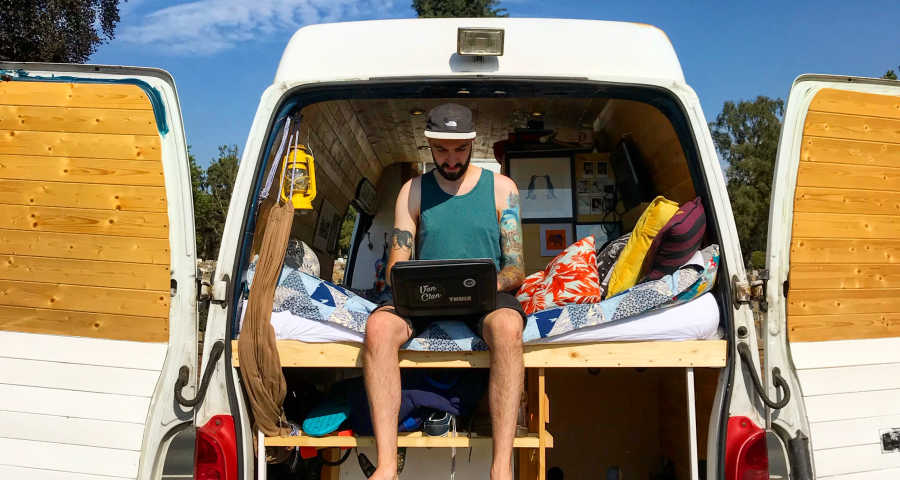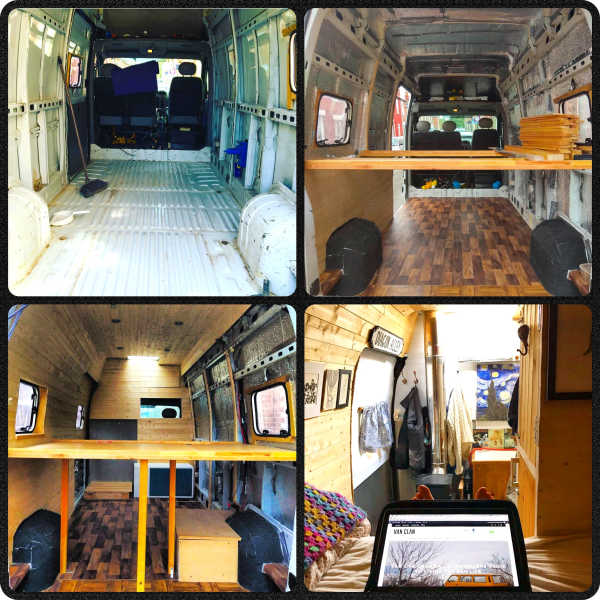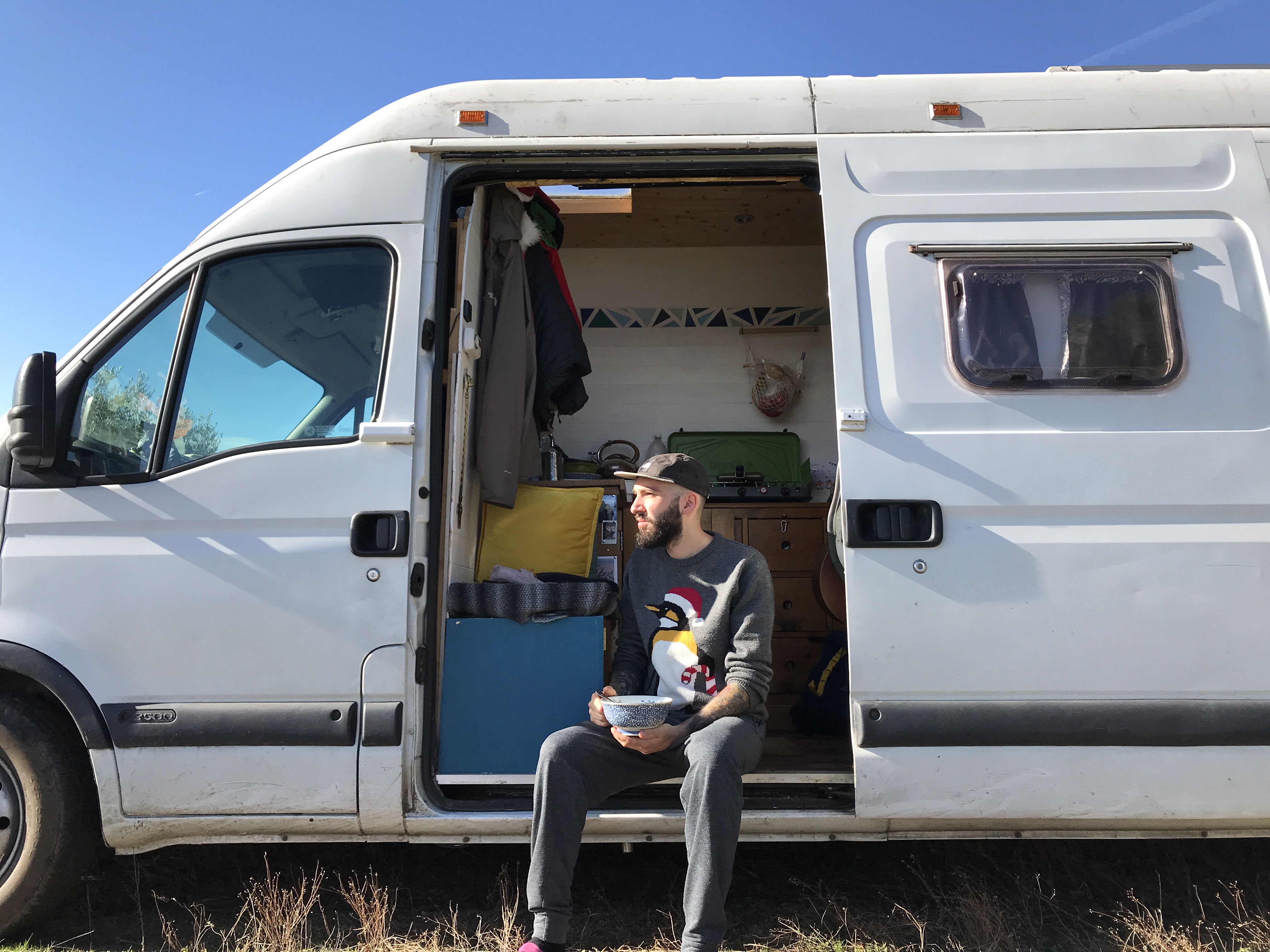Top Tips for Self Van Builders
August 15, 2024

Photo credit @sebsantabarbara
If you’re heading out on a self-conversion journey, then are so many things to consider. Everything can seem so alien, especially when you’re considering putting your entire life into a tiny box on wheels instead of a two-story house.
In this blog post, I’ve tried to think of some of the key things that I considered while both buying and building my van, things that I’ve told countless people building their own vans over the years to put their mind at ease about the whole process. Of course, this is a small drop in the ocean, and you can read my other works here on Lippert or check out my books to get a more in-depth insight into what it means to live small to help you get from A to B on your vanlife journey.
A Guide To Picking The Perfect Van

Photo credit @sebsantabarbara
Never buy a van while it’s raining or a van that has been ‘freshly washed’
If you see a van that’s wet, then don’t buy it. I’m serious; car companies use water droplets to hid imperfections in the meta, and they can be used to hide dints, scratches, or even weld lines. Come back when the van is dry or insist that you dry it down before purchasing.
Water droplets can hide noticeable rust spots that have been covered over with Hammerite metal paint dabbed on with a paintbrush. I’ve seen vans that I could have made a dot-to-dot picture on the outside of the van from all the ‘bright white paint splodges’, and that’s definitely too much uncertainty to be dealing with when you’re looking at getting a van for your new home.
Check the history of the van
If you’ve got the details of the REG number of the vehicle, do a check online to see if the vehicle has shown any problems when being checked over by professionals. If there’s a recurring fault that shows up, then at least you’ll know before you arrive. It’s also possible to discern how many previous owners have owned the vehicle and whether the vehicle is currently meets all the road laws of your country.
Inspect the vehicle chassis
I once looked at a car that looked like a sportscar up top and a rust bucket underneath. It’s no good having a beautiful van with a hole in the metalwork because the chassis is rusted and rotten. Get down on the ground and look for orange flaking underneath the chassis. Check the suspension and the exhaust for any signs of rust or corrosion.
Make sure the engine is cold before you take it for a test drive
One of the oldest tricks in the book is to warm up an engine before you arrive to look at a van so that the vehicle starts straight away. That could mean that there’s a problem with the transmission or battery. If the bonnet is warm or the temperature gauge shoots straight up when you turn the ignition, then that’s a sure-fire sign that it’s been warmed up before you arrive. If this is the case, ask to come back another day or leave the van alone.
Put your hand in front of the exhaust
If you put your hand in front of the exhaust pipe for 5 seconds and see black spots on your hand, then it could be a sign that the engine hasn’t been looked after or the fuel lines need cleaning. Don’t put your hand on the actual exhaust pipe as it will get hot; leave a 15-20cm gap for safety.
Look for signs of wear and tear
Did you know that you can check the seatbelt to see how much wear and tear your van has had? Fraying on the seatbelt, steering wheel wear, a sticky door catch; they’re all signs that a van might be older than it looks on the clock or on paper. Let’s use an example of a delivery van from the mail service or an ambulance; if it says 30K miles on the clock but It has a battered seatbelt and a steering wheel that looks like it’s been on a 10-year-long road trip, then alarm bells should be ringing.
Always make time for a test drive
You’ve got to get in and drive a van before you take it home and start building it. Make sure you get behind the wheel and drive somewhere where you can get a feel of the clutch, the gears, and the accelerator noises. Listen without the radio on for anything rattling or grinding too. Use everything that you can including the indicators, making sure to get out and check that all the lights are working while the engine is on etc.
Inspect Everything Carefully Before Building
Whether you’re buying a van that has been already converted that you’re stripping apart or buying a vehicle that has just been used for transportation, look at every inch of the metal to make sure there are no cracks or holes. It’s a good idea to get inside it when it’s raining too to make sure there are no leaks before you start putting wood and insulation into the mix. Clean the interior, spend some time inspecting, and don’t build till you’re happy you’ve got a watertight vehicle.

Photo credit @sebsantabarbara
Picking Your Sleeping Arrangements
Getting a good night’s sleep is incredibly important when your home is on wheels. You need to make sure that you’re well rested before getting back on the road, especially if you have a long drive ahead.

Photo credit @sebsantabarbara
The argument about having a fixed bed vs a rock ’n’ roll bed (i.e one that becomes a sofa during daytime use) is one that will go on forever. I’m firmly on the side of having a fixed bed as you will no doubt have picked up from my extensive writings on vanlife. Coming back to a ready-made bed after a long day or while feeling ill makes your van feel more like home. It’s a simple thing but one that is worth its weight in gold in my humble opinion.

Photo credit @sebsantabarbara
Kitchen Ideas

Photo credit @sebsantabarbara
The van bulkhead wall is one of the best places for your kitchen as you can easily let steam out of the side door while cooking. It’s also a great place for you to put your gas and water so you have easy access to it when filling up and emptying at campervan service spots.
Like sleep, you need food in order to function properly. I find it hard to concentrate when I haven’t eaten properly, and you definitely need your wits about you when you’re out on the road with other drivers.

Photo credit @sebsantabarbara
I’m of Italian descent, so cooking and the preparation of food is incredibly important to me. If you have a great cooking area that you can stand up in and enough room to make meals for yourself and others, then you can keep a happy belly and also make friends on the go too.


Photo credit @sebsantabarbara
To Shower or Not To Shower
If you’ve never lived in a van or done a lot of travelling, then you’re probably wondering what to do about showering. So many people have said to me that ’they need to have a shower’ because it’s the only way to keep clean. I’m not here to tell you how to live, but I would honestly say that it’s not needed. There are enough Aires, gyms, swimming baths, and hot springs around for you to get clean in, and the most useful piece of kit you can bring in your van is a solar shower bag, a hang up shower kit that you can string from a tree or the back of your van for showering on the go.
The thing is, having a shower on board means that you’ll have to drive with a heavy tank of fresh water and then find somewhere to empty it all too. It’s extra weight to carry and it means you won’t be able to go that far off grid either. I spent many years boiling clear lake water and filing up shower bags using hot spring water to wash in, and filling up shower bags in camper service areas too – you can still shower with a great view without carrying all the extra weight!

Photo credit @sebsantabarbara
Think Carefully About Your Heating
Heat is so important when it comes to living off grid. You can be in a warm climate and still have cold nights, so having a suitable and reliable heat source is key. I had a wood burning stove in my van for a while but opted to replace it for a diesel heater for insurance purposes while travelling and for pure ease too.
Diesel heaters create more of a dry heat than a petrol night heater and create much less condensation. Try and heat all of your van equally to avoid any damp forming too, and always make sure to have some hot water bottles on hand as well as blankets for extra cold nights. They help to make things cosier too!

Photo credit @sebsantabarbara
About the Author

Lippert guest blogger, Sebastian Antonio Santabarbara, is a thirty-two-year-old writer from Yorkshire, UK. His first breakthrough role came as the Head of Written Content for Van Clan, an online media brand documenting the van life movement with a weekly reach of over 5 million readers. This role has led to Sebastian being head-hunted to write several inspirational non-fiction books on alternative living (to be published by Frances Lincoln 2022/23) and Van Life for Dummies (published by John Wiley & Sons Sept 2022). He is also the Editor in Chief for Retro Dodo, a media/news company with a monthly reach of 1 million people. Follow his travels on Instagram!
Recent Posts
7 Best Countries for Wild CampingTop Tips for Self Van Builders
5 Best Camper Van Batteries
Common Van Life Problems and How to Combat Them
How Much Does Vanlife Cost
How to Save Space by Choosing the Right Campervan Bed Insights From Vanpuravida
5 Easy Van Life Recipes
Is Vanlife Legal?
Expert Tips for Cleaning a Campervan
Things You Need to Know When Living in a Camper
View All ›
Never miss a blog post!
Subscribe to Lippert’s blog and receive an email when a new one is posted.